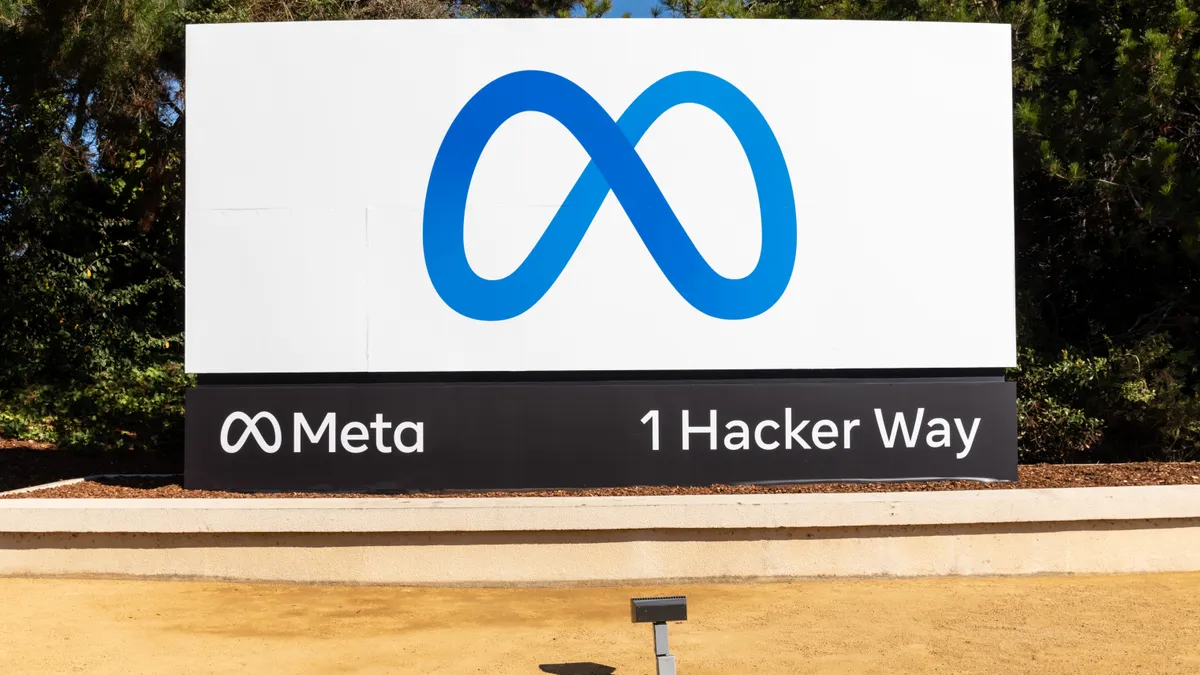Dive Brief:
- Social media and technology platform Meta will likely be “making some tough decisions” to shutter projects and teams in certain areas, CFO Susan Li said Thursday during Morgan Stanley’s Technology, Media and Telecom conference.
- The consolidations — which will follow layoffs at the company in November — are aimed at fulfilling CEO Mark Zuckerberg’s goal of making 2023 the “Year of Efficiency” for the social media company, he said in early February during Meta’s fourth quarter earnings call. Meta has faced pressures from continued economic headwinds, which made 2022 a challenging year for the business, Li said.
- The dissolution of certain projects and teams comes as Meta continues to look across the company and “really evaluate, are we deploying our resources toward the highest leveraged opportunities?” Li said.
Dive Insight:
The Menlo Park, Calif.-based company is also looking to “streamline” management layers as well as cross-functional teams as part of its push toward efficiency, Li said.
“This is really hard — these are all great products and great ideas, but aren’t necessarily the highest priority place for us to invest now,” Li said. “So I think you’ll see that we’re going to be in an ongoing reevaluation and reprioritization process.”
Li, a 14-year alum of the social media and technology company, took on the CFO seat in November, having previously served as vice president of finance.
The move came on the tails of Meta’s first-ever revenue decline in its second quarter of 2022, and followed approximately a month after long-time executive Sheryl Sandberg announced she would be leaving the company. Javier Olivan, who joined Li for the conference discussion Thursday, was tapped for the Chief Operating Officer seat following her departure.
Meta’s “year of efficiency” comes on the heels of a disappointing 2022 for the company, which, like others in the technology sector, struggled to overcome economic headwinds and clamp down on costs. The company posted another decline in revenue for its fourth quarter, seeing a 4% dip to $32.1 billion, according to its Feb. 1 earnings results.
The company’s efforts to further consolidate its operations and management are “ongoing,” Li said, noting that “really, our efficiency work began in 2022 and has been ongoing into 2023.”
Such ongoing efforts may include more layoffs for the social media and technology company, which announced it would laying off 13% of its workforce in November, cutting approximately 11,000 workers. Another round of layoffs could begin as soon as this week, Bloomberg reported Monday, which could potentially affect thousands of Meta employees.
Still, while “profitability is near and dear to my heart, this is not just in service of cost-cutting,” Li said of Meta’s efficiency goals.
“This serves to make us more efficient and more productive, but it’s also in service of making us a company that can build more and ship faster and making sure that core tech product development is really at the center of what we do,” Li said.
COO Olivan, who has served in the role since August, said that while “a lot of these things sound like cost-cutting ... you really don’t cut your way into growth.”
By focusing more on consolidating its teams, Meta is “finding ways to drive incremental revenue in much more efficient ways,” Olivan said, noting he is focused on bringing the firm’s business and product teams closer together.
Meta is really focused on the long run cost structure, and in “some of these places, actually getting to a better long-run cost structure might mean incurring a little more cost up front,” Li said. Its core product development and business processes are places that could benefit from heavier automation, she said by way of example, with Meta therefore needing to invest further to build the tooling and the infrastructure which can enable them to do so.
Investments in heavier automation and in emerging tools such as artificial intelligence offer promise to the company, with Zuckerberg highlighting AI as the “foundation” of Meta’s discovery engine and ads business on its fourth quarter earnings call. Zuckerberg also pointed to further investments in the technology as a key step in driving efficiency.
The company is working to deliver its 2023 roadmap while spending less on capital expenditures, he said, and is also working on “flattening our org structure and removing some layers of middle management to make decisions faster as well as deploying AI tools to help our engineers be more productive,” he said.
“In terms of our AI investments, right now basically all of our capacity is going towards ads, feeds and Reels,” Li said Thursday, noting the company is “playing catch-up” when it comes to AI capacity currently.
With generative AI, right now Meta’s focus in on setting up the right teams and talent — it is “not a meaningful driver of capex for us,” she said. “But it’s a place where I absolutely could see there being a compelling opportunity to deploy more capacity in the future.”












